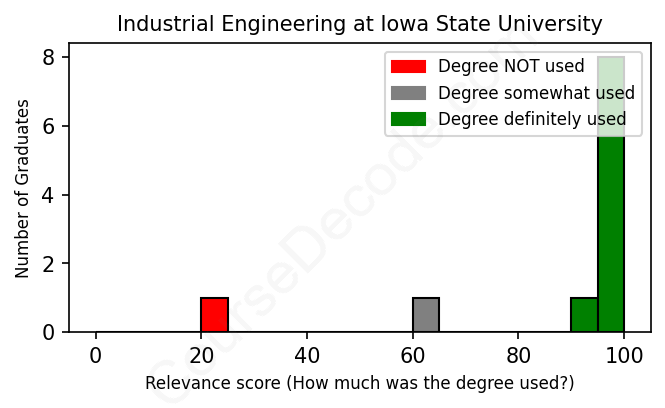
First, some facts. Of the Industrial Engineering graduates from Iowa State University we've analyzed , here's how many have used (or NOT used) their degree in their career:

These are estimates based on AI analysis of 11 LinkedIn profiles (see below).
The verdict? Great! Overall, with an average relevance score of 88%, Industrial Engineering graduates from Iowa State University have a substantially higher likelihood (+21%) of finding work in this field compared to the average graduate across all fields:
And for comparison, here's the chart for all profiles we've looked at across all degrees.
Also, after graduating, 45% of these graduates have pursued further education other than another Bachelor's degree (such as a Masters degree or other), compared to the average across all profiles of 35%. This suggests you may need more than just a Bachelors degree to be competitive as a Industrial Engineering graduate.
See the details:
|
Relevance score: 97% We think this person has gone into a career highly relevant to their degree. We think this person has gone into a career highly relevant to their degree.
DEGREE INFOGraduated in 2015 from Iowa State University with a Bachelor of Science (B.S.) in Industrial Engineering. Also pursued further education since (see below). JOB HISTORY SINCE GRADUATIONManufacturing Engineer E.D. Etnyre Jan 2016 - Nov 2016 Process Engineer  Yanfeng Automotive Interiors Feb 2017 - Nov 2018 Manufacturing Engineer  Fairbanks Morse Apr 2019 - Feb 2020 Industrial Engineer  Modis Feb 2020 - Mar 2020 Industrial Manufacturing Engineer  Hufcor, Inc Jul 2020 - Nov 2020 Industrial Engineer II  Generac Power Systems Mar 2021 - Jun 2023 Manufacturing Engineering Leader  Novares Group May 2023 - Oct 2023 Production Manager  Novares Group Oct 2023 - Feb 2024 FURTHER DEGREES DONE SINCE GRADUATINGMaster of Business Administration - MBAUniversity of Wisconsin-Whitewater 2021 - 2023 ABOUTProduction Manager with an expertise in lean manufacturing and industrial engineering. |
The top 10 most common jobs done by the graduates we've analyzed (ranked most common to least) are:
When looking at the career paths of Iowa State University graduates in Industrial Engineering, it seems that many have landed roles in quality assurance, operational excellence, and engineering positions within various industries. A lot of these roles focus on applying engineering principles to real-world problems, from optimizing manufacturing processes to ensuring product quality. For instance, graduates frequently find themselves as quality engineers or in roles related to process improvement, which directly ties back to the principles they learned in their degree programs. You can see this especially with alumni who joined companies like John Deere or SpaceX, where engineering skills are fundamental to the roles they occupy.
However, not all positions are strictly relevant to Industrial Engineering. Some graduates have taken on jobs in finance, project management, or even roles that lean more towards operational oversight without a strong emphasis on engineering fundamentals. For example, graduates working as financial analysts or in operations management roles at companies like Target may employ some general problem-solving skills from their training, but these positions don’t directly utilize the technical skills associated with Industrial Engineering. Overall, while many graduates find jobs that align closely with their major, there is a noticeable mix of roles where the direct application of industrial engineering principles varies significantly.
Here is a visual representation of the most common words in job titles for Industrial Engineering graduates (this is across all Industrial Engineering graduates we've analyzed, not just those who went to Iowa State University):

The graduates from Iowa State University with a degree in Industrial Engineering have generally carved out promising career paths in various industries. It appears that many of them land their first jobs shortly after graduation in roles such as quality engineers, manufacturing engineers, or even operational analysts. For instance, graduates from 2011 and 2012 found roles at solid companies like John Deere and Bunn-O-Matic Corporation, demonstrating that their degrees are leading them to relevant positions right out of college. It's not uncommon for these initial roles to involve process improvement, quality control, or production management, which align well with their education in industrial engineering.
Looking a bit further down the line—around five to ten years out—many of these professionals continue to ascend in their careers. Take the graduates who began as quality engineers or production supervisors; over time, many have transitioned into senior roles, such as Senior Quality Engineer or Operations Manager. Some have even made significant strides into managerial positions at large companies like SpaceX or Accenture. Overall, the trajectory for these graduates appears strong, with a healthy mix of upward mobility and opportunities in fields directly related to industrial engineering. This suggests that a degree from Iowa State not only provides a solid foundation but also a launchpad for a fulfilling career in engineering and management positions across diverse industries.
Honestly, a Bachelor’s degree in Industrial Engineering can be pretty challenging, and I’d say it’s about average to a bit on the tougher side compared to some other majors. At Iowa State University, you'll dive into a mix of math, science, and engineering principles, which means you’ll be solving a lot of problems and working on projects that require critical thinking and attention to detail. There are definitely some intense courses, particularly in statistics and operations research, but if you keep up with your studies and stay organized, it’s totally manageable. Just be ready to put in some late nights during midterms and finals—it’s all part of the process!
Most commonly, in the LinkedIn profiles we've looked at, it takes people 4 years to finish a Bachelor degree in Industrial Engineering.
Looks like these Iowa State University grads are doing pretty well for themselves! The ones with experience, especially those moving up the ranks at major companies like SpaceX and Accenture, likely have decent salaries, especially as they transition into management roles. The folks starting out in places like Hormel Foods or Graco might not be pulling in as much right away, but it’s a solid start for recent grads. Also, engineering and consulting roles typically pay well, so over time, they can see their earnings grow significantly. Overall, I’d say they've got a good earning trajectory ahead of them!
Here is a visual representation of the most common words seen in the "about" section of LinkedIn profiles who have a Bachelor degree in Industrial Engineering (this is across all Industrial Engineering graduates we've analyzed, not just those who went to Iowa State University). This may or may not be useful:

Here are all colleges offering a Bachelor degree in Industrial Engineering (ordered by the average relevance score of their Industrial Engineering graduates, best to worst) where we have analyzed at least 10 of their graduates:
| College | Score | Count |
|---|---|---|
 Iowa State University Iowa State University
|
88 | 11 |
 North Carolina State University North Carolina State University
|
87 | 12 |
 California Polytechnic State University-San Luis Obispo California Polytechnic State University-San Luis Obispo
|
87 | 15 |
 Texas A&M University Texas A&M University
|
83 | 39 |
 Purdue University Purdue University
|
81 | 36 |
 University of Central Florida University of Central Florida
|
80 | 23 |
 Georgia Institute of Technology Georgia Institute of Technology
|
80 | 59 |
 Penn State University Penn State University
|
79 | 16 |
 Texas Tech University Texas Tech University
|
79 | 10 |
 University of Pittsburgh University of Pittsburgh
|
79 | 15 |
 University of Washington University of Washington
|
78 | 12 |
 University of Arkansas University of Arkansas
|
78 | 11 |
 University of Wisconsin-Madison University of Wisconsin-Madison
|
76 | 13 |
 University of Illinois at Urbana-Champaign University of Illinois at Urbana-Champaign
|
73 | 15 |
 West Virginia University West Virginia University
|
71 | 19 |
 Clemson University Clemson University
|
69 | 23 |
 University of Florida University of Florida
|
64 | 11 |